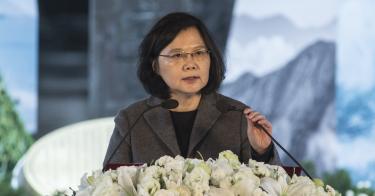The Senate on Wednesday night again passed the Taiwan Allies International Protection and Enhancement Initiative (TAIPEI) Act.
Sponsored by Sen. Cory Gardner, R-Colo., in the Senate, and Rep. John Curtis, R-Utah, in the House, this timely and bipartisan initiative to support Taiwan in the face of Chinese coercion is now on its way to President Donald Trump’s desk.
The president’s signature is a given.
The TAIPEI Act endorses key elements of the administration’s Taiwan policy. It encourages support for Taiwan’s meaningful participation in international organizations and even membership where appropriate. It also calls for the administration to use America’s international heft to help Taiwan maintain its current 15 “diplomatic allies,” i.e., countries that still formally recognize it as a sovereign nation.
Trump should take Congress’ advice to heart.
Previous administrations were hamstrung by hypersensitivity over the Chinese reaction and the irony that the U.S. itself derecognized Taiwan in favor of China more than 40 years ago.
On the first score, the Trump administration is clearly not as sensitive to Chinese complaints as previous presidents. Second, it appears wisely comfortable with the contradiction. Perhaps the administration understands that U.S.-China relations always have been a mess of contradictions. Most fundamentally, the U.S. does not acknowledge Taiwan as an independent country despite the fact that it is entirely self-governed.
That’s fine if it helps keep the peace and Taiwan can maintain its democratic way of life, free to make its own decisions. And if we can live with this incongruity, we can live with the U.S. cajoling and pressuring the small countries that currently recognize Taiwan to continue to do so.
Gardner and Curtis get this. They also know that over time Taiwan’s economic relationships will have an impact on its de facto autonomy. That’s why they included language calling on the U.S. to start negotiations with Taiwan on a free trade agreement. Also because it would make an excellent free trade partner.
The problem is that last week, the version the House approved 415-0 left out the reference to the free trade agreement, reportedly on the insistence of the Democratic majority on the House Ways and Means Committee.
It’s unclear what motivated its objections. The explanation offered by a spokesperson was that changes were made to preserve congressional prerogatives to determine trade policy. That doesn’t make sense. The legislation was attempting to do precisely that, suggesting the administration pursue a free trade agreement.
In the bill’s final iteration, the committee did allow for strengthened bilateral and economic relations, and it suggested the U.S. trade representative consult with it on “opportunities” to achieve that. That’s an opening.
If Taiwan can move forward on a couple of key trade issues, it may find a more interested committee, which is something it must have.
So, once Trump signs the legislation, he should focus on what the Senate initially agreed to unanimously last October, and what the House undoubtedly would endorse if it were put to a vote. He should take up Congress’ challenge and begin to consult with it specifically on initiating talks with Taiwan on a free trade agreement. That’s where the greatest opportunity lies.
This piece originally appeared in The Daily Signal



